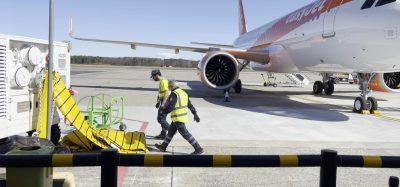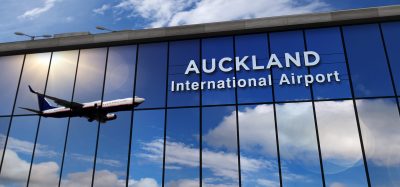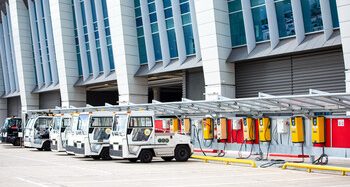Ground Handling: A global perspective
- Like
- Digg
- Del
- Tumblr
- VKontakte
- Buffer
- Love This
- Odnoklassniki
- Meneame
- Blogger
- Amazon
- Yahoo Mail
- Gmail
- AOL
- Newsvine
- HackerNews
- Evernote
- MySpace
- Mail.ru
- Viadeo
- Line
- Comments
- Yummly
- SMS
- Viber
- Telegram
- Subscribe
- Skype
- Facebook Messenger
- Kakao
- LiveJournal
- Yammer
- Edgar
- Fintel
- Mix
- Instapaper
- Copy Link
Posted: 31 July 2007 | | No comments yet
In this Q & A session we brought together three heads of ground handling from three very different regions, to see how their outlooks varied.
In this Q & A session we brought together three heads of ground handling from three very different regions, to see how their outlooks varied.
What is the most common problem you face within your ground handling operation?
Baroni (Europe):
Our most common problem is flight delays, leading to a shortage of resources at the stands and gates.
Vassiliadis (North America):
To clarify, McCarran airport does not conduct any ground handling operations within the Department of Aviation. The airlines themselves contract through the McCarran Business Office with various companies that provide that service. Understanding that condition, there are a couple of areas that continue to be problems when working with tenant ground handling operations. They are:
- Disregard for airport operating directives when operating vehicles on the ramp area, speeding, driving outside the marked roadway and damaging airport property are events that happen every day. This is also reflected in the employee’s attitude when issued an airport citation for any violation.
- Knowledge of proper care and operation of the various kinds of GSE that each company possesses. Training is minimal.
- GSE parked, blocking access for ground emergency vehicles to various locations on the ramp area.
- Keeping track of which airline has which company performing its ground handling operation due to changes always being made.
Murad (Asia-Pacific):
The problem of discipline is common when it comes to ground handlers parking their equipment/vehicles in the correct areas, also FOD issues and some not following Apron regulations.
Turnaround times are of the utmost importance. How do you ensure that these remain competitive?
Baroni:
We monitor live and on a time line, critical processes. Ground times for A320 types were reduced last year from 40 minutes to 30 minutes, which is as competitive as can be.
Vassiliadis:
From the airport’s perspective, a standard operating permit has been developed for the ground handlers working for the airlines, along with McCarran Rules and Operating Directives. Enforcement of these documents is conducted by the Operations Coordinators who continuously drive the ramp, taxiway, and runway areas. Additionally, gating of aircraft is pre-identified, based upon the weekly schedule provided by the airline. If problems exist then the McCarran Ramp Control, who directs traffic movement on the ramp, would know which gates are available to handle any situation deviating from the schedule (late/early arrivals). That would be the contribution that McCarran airport would make.
Murad:
We as airport operators will try to ensure that all of our facilities, such as PLB and it’s associated facilities, refuelling hydrants, pavements, AGL etc., are in good and serviceable condition. The apron shall be kept as clean as possible and all of our taxiways and runways remain open 24 hrs a day, 365 days a year.
Does your airport purchase equipment as and when it is required or do you have a purchasing plan?
Baroni:
There is no fixed purchasing plan at Zurich International Airport.
Vassiliadis:
The airlines or its contract ground handlers are required to purchase the equipment. The Department of Aviation monitors the ramp to ensure the equipment is present and serviceable according to the operating directives and regulations. If the equipment is found unserviceable, it is tagged and then the tenant has 24-hours to remove the GSE item off of the airport for repair. If the tenant disregards the notice then an administrative penalty is issued which could be monetary in nature. If a piece of GSE is found abandoned then the item is removed by a salvage company at the direction of the airport.
Murad:
We do have a purchasing plan and we will phase out old equipment when the time comes. However, if there is a new item of equipment/technology that can serve us better in the marketplace, we will look into it and may make purchases on an ad-hoc basis.
What measures do you take to ensure that the ramps and aprons are safe places to work?
Baroni:
There are regular campaigns to improve ramp safety and we have a specialised ‘Ramp Safety Unit’ supervising ramp activities.
Vassiliadis:
New employees working at McCarran that are required to operate a vehicle of any type on the ramp or movement areas of the airport are required to complete a driver training course. For everyday operations on the airfield, the airport has established Airport Operations Coordinators that constantly inspect the runways, taxiways, and ramp for emergencies, unsafe practices, and violators of the McCarran Operating Directives, Regulations, and Rules. Driving specially marked vehicles, the Coordinators are present 24-hours a day, 7-days a week. For violations of any type (environmental, fuel spills, security, driving, or housekeeping) the Coordinators will depend on the egregious nature of the situation and can issue a verbal warning, to an airport citation for the violation. Repeated violations by the same company or person are dealt with by administrative penalties if necessary. Additionally, the airport also conducts three other services on the ramp that contribute to safe operating conditions. The first is routine weekly cleaning operations around the gates of the different terminals on the airport. The second is each month, the paint markings on the ramp areas are evaluated to determine if new paint is necessary to enhance the specific marking, if so then it is painted within that week. Lastly, twice a year the ramp areas, where aircraft park, are cleaned of all hydrocarbons (high pressure heated water with a solvent is sprayed and brushed) that build-up due to the activity around each aircraft while it is being turned for the next flight.
Murad:
There are many measures such as safety campaigns, regular safety audits internally as well as externally, standard operating procedures, sweeping schedules, maintenance schedules, safety talks, seminars, internally and externally, safety targets etc. Most important is the cooperation between the ground handlers and the airport operators. Safety is everyone’s business and everyone should be concerned with standards. We cannot achieve safety working alone.
Andrea Baroni
Andrea Baroni started his aviation career in 1970 in Swissair’s flight operation. After spending 10 years as station manager abroad (Buenos Aires / Kinshasa), He returned to Switzerland in 1982 and worked as Network Manager in Operations Control. In 2002 he managed a project for the Airport of Zurich (build-up of an Operations Control Centre for the airport), then in 2004 was appointed Head of Airport Operations.
Rosemary A. Vassiliadis
Rosemary A. Vassiliadis joined the Clark County Department of Aviation on December 1, 1997, as Deputy Director. In this position, Ms. Vassiliadis oversees all operations for McCarran International Airport, as well as general aviation airports in North Las Vegas, Henderson, Jean and Overton. She is responsible for more than 1,200 employees in nine major divisions. In addition, she leads the department in the absence of the director. In 2000, “In Business Las Vegas” named Ms. Vassiliadis to its inaugural list of Southern Nevada’s most influential businesswomen.
Dato’ Azmi Murad
Dato’ Azmi Murad, aged 55, is the Senior General Manager of Operation Services, MAHB. He started his career with the Department of Civil Aviation in 1970 as an Air Traffic Controller. He was later appointed Airport Manager for Kota Bharu, Alor Star, Kota Kinabalu, Penang International Airport and KLIA. He was involved in the opening of KLIA in 1998 as Head of Operations, Malaysia Airports (Sepang) Sdn. Bhd. Since then he has gained substantial experience in the management and operations of airports. Currently, he is the Vice Chairman of ACI World Facilitation and Services Standing Committee.

















